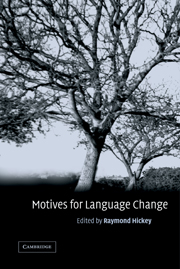Book contents
- Frontmatter
- Contents
- Notes on the contributors
- Acknowledgements
- Introduction
- Part I The phenomenon of language change
- 1 On change in ‘E-language’
- 2 Formal and functional motivation for language change
- Part II Linguistic models and language change
- Part III Grammaticalisation
- Part IV The social context for language change
- Part V Contact-based explanations
- Part VI The typological perspective
- Index
- References
1 - On change in ‘E-language’
Published online by Cambridge University Press: 22 September 2009
- Frontmatter
- Contents
- Notes on the contributors
- Acknowledgements
- Introduction
- Part I The phenomenon of language change
- 1 On change in ‘E-language’
- 2 Formal and functional motivation for language change
- Part II Linguistic models and language change
- Part III Grammaticalisation
- Part IV The social context for language change
- Part V Contact-based explanations
- Part VI The typological perspective
- Index
- References
Summary
In a view that is widespread among linguists, change in language is not simply change in ‘speech’: what is affected is ‘a language’, and by that is meant a system, at an underlying level, that in any community constrains the forms that speech behaviour can take. As a system changes so the speech in that community, which is partly determined by it, also changes. But a historian is not concerned directly with observed shifts in how people behave. We are seen instead as trying to explain how languages, as underlying systems, change from one state to another. We may speculate that they are subject to specific structural laws. We may posit laws of history by which changes in their structure have to follow one route rather than another. In this light, we develop theories in historical linguistics of a sophistication quite unheard of in most other fields of history.
The distinction between speech and language goes back to Saussure, and arguably beyond. In the terms, however, in which Chomsky has recast it, every individual speaker has what he calls an ‘I-language’, and the underlying changes are among I-languages developed by a changing population in successive periods. In any individual, the one formed in childhood will determine, in part, how that individual will speak; and that speech, in turn, will be part of the experience by which new members of the community form their own I-languages.
- Type
- Chapter
- Information
- Motives for Language Change , pp. 7 - 17Publisher: Cambridge University PressPrint publication year: 2003
References
- 1
- Cited by



